Enhanced Recovery After Surgery (ERAS) - Nephrectomy - 18 Weeks
Enhanced Recovery After Surgery (ERAS) - Nephrectomy - 18 Weeks
Enhanced Recovery After Surgery (ERAS) - Nephrectomy - 18 Weeks
- No tags were found...
You also want an ePaper? Increase the reach of your titles
YUMPU automatically turns print PDFs into web optimized ePapers that Google loves.
Preparing for <strong>Surgery</strong>The day before surgery you will be able to eat and drink as normal, you will also be givenhigh carbohydrate drinks. These are an essential part of your care and help boost yourenergy prior to surgery. You will be given instructions on how and when to take these.Once you are in hospital, you will be given a blood thinning injection, to help reduceyour risk of blood clots.What Happens To Me When I Arrive At The Ward?You will be admitted on the day of surgery. We will ask that you administer an enema onthe evening prior to your admission. This will help clear you bowels in preparation forthe operation.On the Day of the ProcedureYou will be admitted on the day of surgery. A nurse will check you in, detail yournormal medications and supply you with special stockings to prevent leg clots. Beforegoing to the operating theatre, you will be asked to change into a theatre gown. Anymake-up, nail varnish, jewellery (except your wedding ring), and contact lenses must beremoved. You will be seen by an anaesthetist who will discuss your anaesthetic as wellas make recommendations about how to manage any pain after the procedure. You willbe consented by your surgeon and after a number of checks have a mark drawn on yourabdomen to confirm the side of operation.You will have nothing to eat or drink for about 2hrs before your operation but will beadvised in more detail when you attend for your pre-op assessment.Your operation will take about 4-5 hours and is performed under general anaesthetic (youare completely asleep during all of this time).What Happens <strong>After</strong> The Procedure?A bed will be booked for you either in ward B31 or the High Dependency Unit (HDU) orintensive care unit (ICU) where your condition can be monitored closely. This is oftennecessary after major surgery, as you will have spent a long time under anaesthetic. Youwill spend 24 to 72 hours before returning to the ward.To reduce pain after the operation you will be given regular painkillers. The anaesthetistwill have discussed this with you and will have decided on either:• A pain killer device that you control releases painkillers into your blood streamthrough a drip. This is called Patient Controlled Analgesia (PCA).• An epidural - pain killers and local anaesthetic are given directly into the spinalnerve system. This involves inserting a very fine tube into your back at the time ofyou operation through which these drugs are given.Final 4 October 2012
equired, before going home and any necessary appointments will be sent to you via aletter to your home address. Longer term we will also want to regularly review yourcondition over the next months and years.Day To Day Living<strong>Recovery</strong> time after abdominal surgery varies but generally you should feelimprovements after about 6 to 12 weeks. During the first 6 weeks after your operationyou should bear the following in mind. Patients who have undergone laparoscopickeyhole surgery should notice improvement earlier than this.• You should NOT drive a car. <strong>After</strong> the 6 weeks you should consider if you wouldfeel comfortable to do an emergency stop without difficulty or pain. You alsoneed to contact your insurance company to check that you are covered to startdriving again.• You should NOT attempt to lift or move heavy objects or perform heavyhousehold work.• You should ask your surgeon when you can return to work. This may varydepending on the type of job you do. You can obtain a sick note for the time youare expected to be off work before leaving the ward.• You can have a bath or shower as soon as the drains are removed. You should notuse perfumed soaps or talcum powder until your wound is well healed.If there is a Problem?If you experience any problems following the procedure, please contact your GP or WardB31 for advice.Ward B31, Forth Valley Royal Hospital (Direct Dial) 01324 567537Urology Specialist Nurses:01324 566889 (Available Monday-Friday 9-4pm)NHS 24: 08454 242424Other Information and SupportMacMillan Money Matters:Stirling - 01786 442694Alloa - 01259 452620Falkirk – 01324 504087Macmillan Cancer Support (provides specialist advice through Macmillan nurses anddoctors and financial grants for people with cancer and their families)89 Albert Embankment, London, SE1 7 UQ0808 808202www.macmillan.org.ukFinal 4 October 2012
Final 4 October 2012


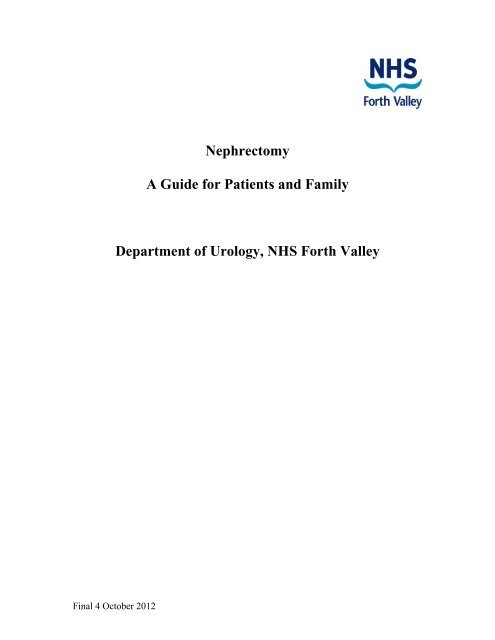
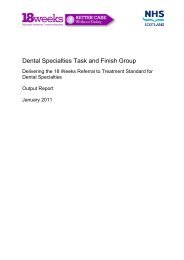

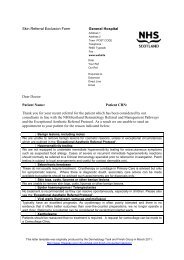
![Dr Matthew Checketts, NHS Tayside [PDF - 6Mb] - 18 Weeks](https://img.yumpu.com/49027155/1/190x143/dr-matthew-checketts-nhs-tayside-pdf-6mb-18-weeks.jpg?quality=85)
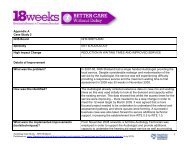
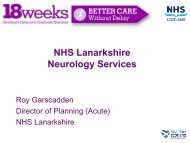
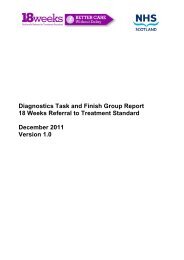
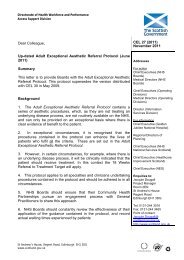
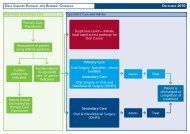

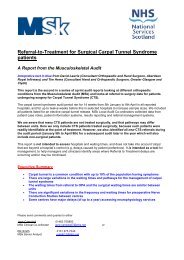
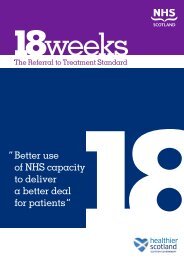
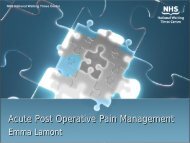
![Mark Sindall, NHS Dumfries and Galloway [PDF - 227Kb] - 18 Weeks](https://img.yumpu.com/30080335/1/190x143/mark-sindall-nhs-dumfries-and-galloway-pdf-227kb-18-weeks.jpg?quality=85)